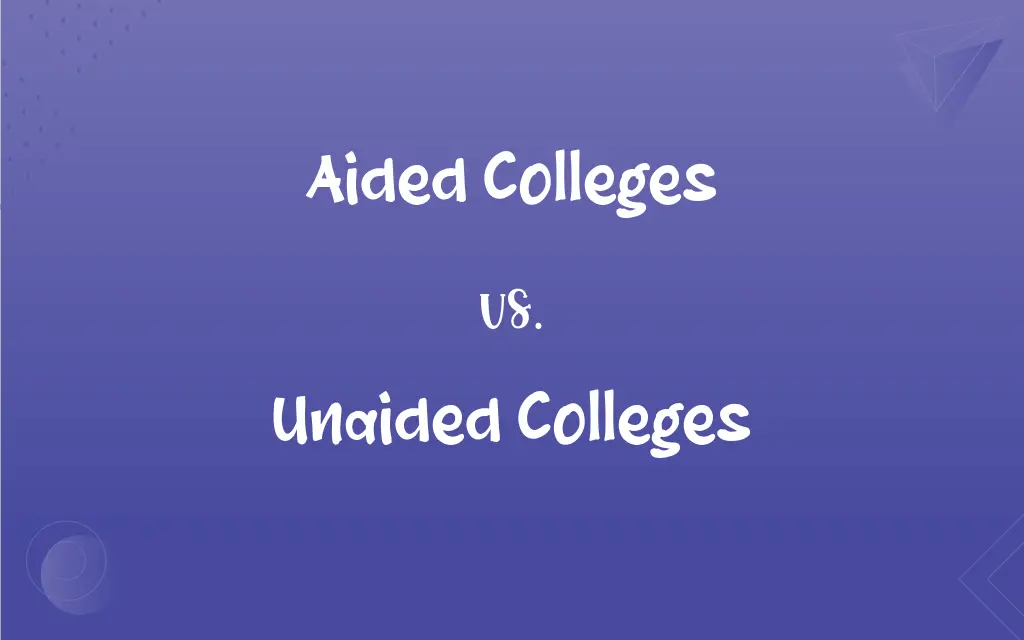Aided Colleges vs. Unaided Colleges: What's the Difference?
Edited by Aimie Carlson || By Harlon Moss || Published on October 30, 2024
Aided colleges receive financial support from the government, while unaided colleges are self-financed and do not get government funding.

Key Differences
Aided colleges are partially or fully funded by the government, ensuring lower tuition fees. Unaided colleges, on the other hand, rely on tuition and private funding, often resulting in higher fees.
In terms of infrastructure, aided colleges may have limitations due to budget constraints from government funding. Conversely, unaided colleges often have modern facilities, reflecting their ability to reinvest tuition fees into campus development.
Faculty salaries in aided colleges are usually paid by the government, providing financial stability for staff. In unaided colleges, salaries are managed by the institution itself, which can vary based on the college's financial health.
Aided colleges must adhere to government regulations in curriculum and administration, which can limit flexibility. Unaided colleges enjoy more autonomy in designing courses and internal policies, catering to market demands.
Admission criteria in aided colleges are often regulated by government policies, potentially including reservations for certain groups. Unaided colleges have the freedom to set their own admission standards and criteria.
ADVERTISEMENT
Comparison Chart
Funding Source
Government support
Self-financed, private funding
Tuition Fees
Generally lower
Usually higher
Infrastructure
May have limitations
Often more modern facilities
Faculty Salaries
Paid by the government
Managed by the institution
Autonomy
Limited, follow government regulations
Higher, more flexible in policies and curriculum
ADVERTISEMENT
Aided Colleges and Unaided Colleges Definitions
Aided Colleges
They offer lower tuition fees compared to unaided institutions.
Choosing an aided college helped me minimize my student debt.
Unaided Colleges
These colleges often have higher tuition fees.
Students at unaided colleges may need scholarships to manage the expenses.
Aided Colleges
Aided colleges' infrastructure might be more traditional due to funding constraints.
The historical buildings of this aided college add to its charm.
Unaided Colleges
They often offer modern infrastructure and facilities.
The modern labs in my unaided college provided an excellent learning environment.
Aided Colleges
Aided colleges receive financial assistance from the government.
The affordable tuition at this aided college is a relief for many students.
Unaided Colleges
Salaries of staff in unaided colleges are managed internally.
The faculty at unaided colleges often experience variable pay scales.
Aided Colleges
These colleges often have more regulated admission processes.
Our local aided college follows strict government guidelines for admissions.
Unaided Colleges
Unaided colleges are self-financed and do not receive government aid.
The unaided college I attended had state-of-the-art facilities, reflecting its higher fees.
Aided Colleges
Faculty in aided colleges receive their salaries from government funds.
Teachers at aided colleges enjoy financial stability thanks to government support.
Unaided Colleges
Unaided colleges enjoy more autonomy in curriculum design.
Innovative courses at this unaided college meet the latest industry demands.
FAQs
Who pays the faculty salaries in aided colleges?
Faculty salaries in aided colleges are usually funded by the government.
How do unaided colleges finance themselves?
Unaided colleges rely on tuition fees and private funding.
What distinguishes an aided college?
Aided colleges receive financial support from the government.
Are tuition fees lower in aided colleges?
Yes, aided colleges generally have lower tuition fees due to government funding.
Are admission criteria different in aided colleges?
Yes, they often follow government-regulated admission processes.
Do unaided colleges have higher tuition fees?
Generally, unaided colleges have higher fees due to lack of government aid.
Can aided colleges design their own courses?
Their course design is often more regulated by government policies.
Do unaided colleges have more modern facilities?
Often, yes, as they reinvest tuition fees into infrastructure.
What is the level of autonomy in unaided colleges?
Unaided colleges enjoy higher autonomy, especially in curriculum design.
What type of infrastructure can be found in unaided colleges?
Unaided colleges often boast more modern and well-equipped facilities.
How do unaided colleges manage staff salaries?
Unaided colleges manage and fund staff salaries independently.
Can aided colleges upgrade their facilities easily?
Upgrades in aided colleges can be challenging due to budget constraints.
Can international students enroll in aided colleges?
Yes, but they must meet the specific admission criteria set by the college.
Are unaided colleges more expensive overall?
Typically, yes, considering tuition and other associated costs.
What is the benefit of attending an unaided college?
Benefits include modern facilities and flexible curriculum choices.
Is job placement different between the two types of colleges?
Job placement can vary based on the college's reputation and industry connections, regardless of funding.
Is financial aid available in unaided colleges?
Many unaided colleges offer scholarships and financial aid programs.
Do aided colleges have restricted course offerings?
They might have less flexibility in course offerings due to government guidelines.
Do aided colleges have a diverse student body?
They often have a more diverse student body due to lower fees and inclusive policies.
Are there government regulations on unaided colleges?
Unaided colleges are subject to standard educational regulations, but have more freedom in internal policies.
About Author
Written by
Harlon MossHarlon is a seasoned quality moderator and accomplished content writer for Difference Wiki. An alumnus of the prestigious University of California, he earned his degree in Computer Science. Leveraging his academic background, Harlon brings a meticulous and informed perspective to his work, ensuring content accuracy and excellence.
Edited by
Aimie CarlsonAimie Carlson, holding a master's degree in English literature, is a fervent English language enthusiast. She lends her writing talents to Difference Wiki, a prominent website that specializes in comparisons, offering readers insightful analyses that both captivate and inform.







































































